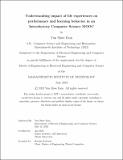Understanding impact of life experiences on performance and learning behavior in an Introductory Computer Science MOOC
Author(s)
Eain, Yun Shwe
DownloadThesis PDF (1.576Mb)
Advisor
Bell, Ana
Terms of use
Metadata
Show full item recordAbstract
In this thesis, we attempt to understand the impact of life experiences on performance and learning behavior in an introductory computer science MOOC (Massive Open Online Course). Through data analysis work, this thesis identifies that some life experiences have an impact on a student’s performance and learning behaviors in the course. When it came to a student’s academic/career life experiences, exposure to the concept of induction in math positively impacts a student’s performance in the final exam, while experience in management negatively affects performance in all graded portions of the class except for problem sets. In terms of learning behavior, students without management experience tend to have performed a higher number of solution submissions and watched a larger fraction of the course videos, while students without extensive experience in writing lengthy reports (20+ pages) show greater engagement in the course forum. In regards to a student’s non-academic life experiences, students with over 50 hours of experience in open-world strategy games tend to perform better in overall grades and problem sets. Lastly, in analyzing dayto- day behaviors, a positive correlation was observed between regular engagement in riddles, brainteasers, or sudoku and overall grades and performance in the final exam, although no significant correlation is found between day-to-day behaviors and learning behaviors in the course.
Date issued
2023-06Department
Massachusetts Institute of Technology. Department of Electrical Engineering and Computer SciencePublisher
Massachusetts Institute of Technology